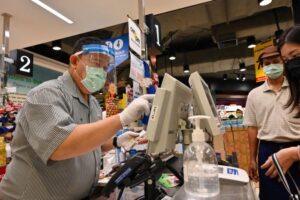
- This piece was edited from a live interview at the “Q2 Arkansas-Asia Briefing” event hosted by the AAAB in June 2021.
- The interviewee is Mr. Ameen Pabani, an immigrant from India, who came to Arkansas and started his multiple businesses about 10 years ago. He currently is the CEO of One Stop Solutions accounting firm and My Flag insurance firm, based in Little Rock. He is also a board member of the AAAB. The interviewer is Yang Luo-Branch of the AAAB (referred to as “AAAB” below).
AAAB: Could you please describe Asian businesses in Arkansas, in a general sense?
Ameen Pabani: If we try to understand what kind of businesses, in a practical sense, the Asians, say, for example, on the Indian side, most of them own the motels, hotels and convenience stores; the Vietnamese run mostly the nail salons, and the Koreans and Chinese are great with their restaurants. Even the Indian cuisine and the Pakistani cuisines are great.
AAAB: What are the common struggles our Asian business owners face in the community?
Ameen Pabani: Most of the Asians who migrated to the United States struggle with two things. The first is the English language barrier. So they try to go into business, and then they will have to interact very minimally with the clientele as they speak very little English. Let’s say, at a nail salon, you would hardly be able to speak to the owner, or in the motel, at the front desk, you will just have an employee greeting you and seldom the owner, for this language reason.
The second barrier is education. Back then and even today, education in Asian countries, is not as great as in America. We get free education in America, where it is not the same in most Asian countries.
AAAB: Because of COVID-19, it’s been a difficult couple of years for the entire world. What were the unique challenges for Asian-owned businesses, as you observe and experience as a business owner yourself?
Ameen Pabani: We are all still facing, I would say, the difficulties and challenges posed by the COVID pandemic. And it was really tough in 2020, especially on the Asian-owned businesses. It comes again and again to my mind, the nail and the beauty salons and motels that had to shut down their businesses because those are the industries that cannot move to the remote. They have to have a physical presence. And the restaurants were hit really hard, too, because of the closures. The big firms, like, say, McDonald’s and Chick-Fil-A, were able to survive with their drive-through mechanisms that were already in place and well established. Whereas for the Asian decents’ restaurants, they either did not have previously existing drive-throughs, or they are not technologically savvy enough to adapt to that fast-changing environment.
On the other hand, the part that is not really affected is the convenience stores, because they were given the status of emergency workers, and they were allowed to be open throughout.
I would really like to congratulate the SBA on this. I personally had a conversation with Edward Haddock at the Arkansas SBA Office earlier last year on helping the program that SBA rolled out to fast and efficiently reach the Asian business owners.
AAAB: Now, do you mind sharing a little bit about yourself – you had COVID last year… how did you manage to recover, while providing for your family and running your business at that difficult time? How was it like?
Ameen Pabani: I was infected by COVID somewhere in July last year, and I had to be laid down for about a month. It was psychologically very stressful because mostly I prefer to meet my clients, and my clients prefer to see me in person. Because of the language barrier, they would like to understand things in their own languages, and I speak more than seven different languages, so it really helps when I explain things to them in their own personal ways.
During that same time, there were so many government programs that were rolling out, and I had to really get deep knowledge of what the rules were for those small businesses, who were my clients. I remember in July when I was infected, the first program was being rolled out by the SBA. The psychological issue came when I was facing my own infection, studying the new SBA program, and I had to send my family, my wife and kids to be with my wife’s brother, my brother-in-law in Memphis, to avoid the risk of transmitting the disease.
So I was all by myself trying to take care of myself as I was answering my clients’ needs. The clients really helped me, though, during that difficult time by offering me some kind of food that is already ready-to-eat or trying to get some medicines for me, and put outside of my door, because I couldn’t go outside of my home. I was in a 14-day quarantine. I do really appreciate the help of my family members and the clients during that difficult time.


Hi, this is a comment.
To delete a comment, just log in and view the post's comments. There you will have the option to edit or delete them.